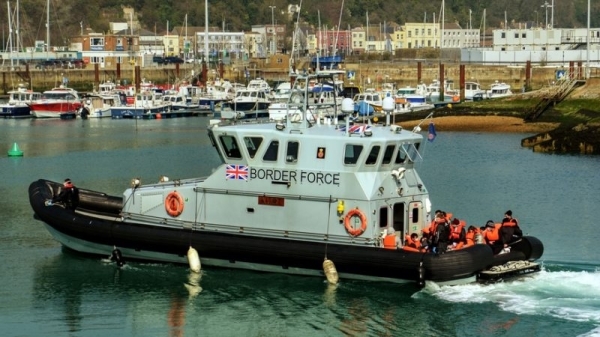Significant drop in Albanians crossing The Channel in 2023

Just 29 Albanians crossed The Channel by boat during the first three months of 2023, a stark contrast to the 12,310 that made the journey in 2022, sparking international headlines and causing diplomatic tensions between Tirana and London.
Albanians have been leaving their country for decades, with 1.4 million emigrating since the end of communism in 1991 and 700,000 going in the last decade. The mass exodus in 2022 of mainly young people, caused a stir in British politics, with the Conservative Party being called out for their harsh rhetoric against Albanians.
A total of 1,109 Albanians were recorded crossing via boat during the last three months of 2022, meaning the number for the first quarter of this year shows a significant decrease. In addition, around 1,000 irregular migrants have been returned to Albania since UK Prime Minister Rishi Sunak pledged to stop the boats and made it one of his top priorities for 2023.
A communique sent by the British Embassy in Tirana to EURACTIV said that this figure combines failed asylum seekers, foreign national offenders, and voluntary returns.
UK and Albanian operational teams have set up a joint migration task force, which serves as the main gateway to coordinate specialised operational measures and actions to manage illegal migration of Albanian citizens to the UK, the statement continues.
“Head of the Albanian Border and Migration Police, Saimir Boshnjaku, said, “we are working hand in hand with our British colleagues under the joint migration task force to prevent irregular migration to the UK and related crimes.”
UK Director General of Immigration Enforcement Tony Eastaugh added, “these numbers are evidence that our partnership with the government of Albania to speed up the removal of those with no legal right to be in the UK is working.”
While Sunak and his supporters may believe his policies and hardline approach have a part to play, others say bad weather has had a part to play along with trafficking gangs fearing consequences due to increased attention on their activities.
Many Albanians travelling to the UK did so after purchasing the trip via social media. Organised crime gangs advertised crossings to the UK for upwards of GBP 2000 with promises of work and a better life at the other end.
Around half of all those seeking asylum in the UK are granted, with a further half being granted on appeal, despite Albania being a safe country of origin with no internal or external conflicts.
Unfortunately, many who made the trip ended up in asylum hotels or camps or working in the black market to pay back their debts to traffickers.
Asylum hotels have been controversial from the onset due to both the cost, shouldered by the government and the fact that out of 200 asylum-seeking children that have gone missing from such sites, 88% were Albanian, according to Minister Lord Murray in January.
“The Home Office have no power to detain unaccompanied asylum-seeking children in these hotels, and we do know that some of them go missing. Many of them that go missing are subsequently traced,” he said in response to Liberal Democrat peer Paul Scriven.
British NGOs have continually sounded the alarm over children going missing and being abducted from accommodation provided by the UK Home Office to keep them safe.
Daniel Sohege, the Director of Stand For All, a human rights advocacy organisation with a particular interest in refugee law and protection, condemned the revelations.
“The [UK] government has done nothing but attack Albanians, ignoring how young Albanian people are one of the most at-risk groups of child trafficking. Its rhetoric, its hostility and its indifference to their safety have led to so many going missing and being exploited,” he wrote on Twitter.
Relations between the UK and Albania have faltered over the ongoing migration issue, leading to the British Government announcing crackdowns on Albanians and Home Secretary Suella Braverman likening their arrival to an “invasion”. This sparked outrage in Tirana, with Prime Minister Edi Rama calling the rhetoric xenophobic and telling the UK government not to blame Albania for its policy failings and internal strife.
At the time of the apparent crackdown on Albanians, the ruling Conservative Party was facing historic lows in popularity polls and was reeling from the departure of former prime minister Boris Johnson, followed by Liz Truss, and then the arrival of current Prime Minister Rishi Sunak.
But, by January, the situation was tense once again as Immigration Minister Robert Jenrick posted a video stating the government is working to “find the Albanians, detain them, to take them to the airport and get back to Tirana” for “gaming the system” and adding they included “dangerous criminals.”
Albanian Foreign Minister Olta Xhacka reacted with shock, stating Jenrick was using such language in return for votes.
In the first seven months of 2022, 5,800 Albanians sought asylum in the European Union making it one of the leading countries for asylum requests in the bloc, year after year, despite being a safe country of origin. Reducing this number is a core requirement of continuing along the path of EU membership, yet numbers remain high.
(Alice Taylor | Exit.al)
More on the same topic...




